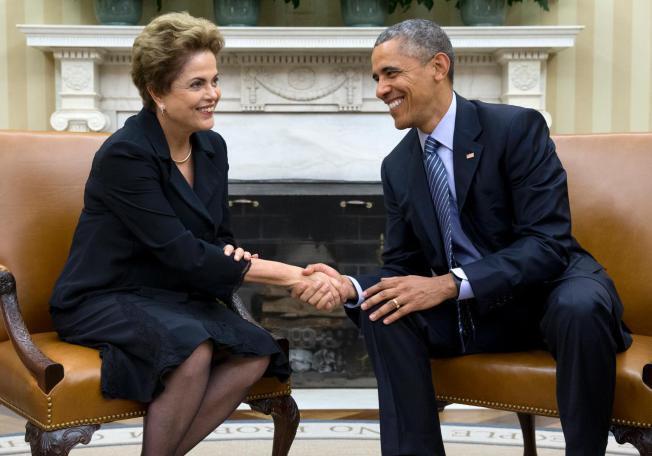 Presidents Barack Obama and Dilma Rousseff
commit to intensify collaboration between the United States and Brazil,
both bilaterally and under the United Nations Framework Convention on
Climate Change (UNFCCC), as our countries work to address the challenges
posed by climate change. The global scientific community has made clear
that human activity is already changing the world’s climate system,
causing serious impacts, putting ever larger numbers of people at risk,
posing challenges to sustainable development, affecting particularly the
poor and most vulnerable, and harming economies and societies around the
world, including in the United States and Brazil.
Presidents Barack Obama and Dilma Rousseff
commit to intensify collaboration between the United States and Brazil,
both bilaterally and under the United Nations Framework Convention on
Climate Change (UNFCCC), as our countries work to address the challenges
posed by climate change. The global scientific community has made clear
that human activity is already changing the world’s climate system,
causing serious impacts, putting ever larger numbers of people at risk,
posing challenges to sustainable development, affecting particularly the
poor and most vulnerable, and harming economies and societies around the
world, including in the United States and Brazil.
Leading Together Towards Paris:
The two Presidents reiterated their call for a successful outcome later this year at the Paris Climate Change Conference. The Paris outcome should send a strong signal to the international community that governments, businesses and civil society are decisively taking on the climate challenge.
The Presidents expressed their commitment to work with each other and with other partners to resolve potential obstacles towards an ambitious and balanced Paris Agreement. Mindful of the long-term goal of limiting global temperature increase to a maximum of 2°C above preindustrial levels, they agreed that there should be strong nationally determined contributions, regular updating by Parties in order to promote greater ambition over time, and encouragement of longer-term strategies for transitioning to low-carbon economies. There should also be strong and credible transparency, including reporting and review, as well as periodic stocktaking of its overall effectiveness. The Presidents are committed to reaching an ambitious agreement that reflects the principle of common but differentiated responsibilities and respective capabilities, in light of different national circumstances.
The Presidents recognize the social and economic value of mitigation actions and their co-benefits to adaptation, health and sustainable development. The Presidents pledged to work together toward mobilizing public funding and developing financial instruments to catalyze large-scale private investments to support low carbon development projects and countries’ transitions to low-carbon economies. Further, the Presidents affirmed the need for continued, robust financial support to help realize developing countries’ mitigation potential and to enhance their adaptation actions.